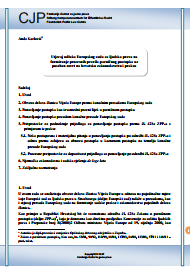Utjecaj odluka Europskog suda za ljudska prava na formiranje procesnih pravila parničnog postupka uz poseban osvrt na hrvatsko zakonodavstvo i praksu
Influence of the European Court of Human Rights decision on the formation of procedural rules of litigation with special reference to Croatian legislation and practice
Author(s): Anđa Karlović
Subject(s): Law, Constitution, Jurisprudence, Constitutional Law, Civil Law, Human Rights and Humanitarian Law, Public Law, EU-Legislation
Published by: Fondacija Centar za javno pravo
Keywords: Public law; constitution; Croatian Civil Procedure Act; ZPP; human rights; European court for human rights; Germany; Republic of Croatia;
Summary/Abstract: The author gives an overview of the provision of Article 428a of the Croatian Civil Procedure Act (ZPP) that was introduced with the Amendments to the Civil Procedure Act of 2003, as the new reason for a retrial based on the judgment of the European Court of Human Rights which established a violation of a right or a freedom guaranteed by the Convention for the Protection of Human Rights and Fundamental Freedoms. First part of the article presents the motion for a retrial as an extraordinary legal remedy, stating the reasons and general prerequisites for retrial. After that, it is investigated the full scope of application of Art. 428a ZPP and relevant cases, especially the case Bistrović v. Croatia as the only decided case on the basis of this article. It is emphasized that the partial regulation of time limits concerning the motion for retrial could represent a problem in the future. The injured party can file the motion within the 30 days from the publication of the judgement by the European Court, but there is no general limit in regard to the moment when the judgement became final, as is the case for reasons established in Art. 421 p. 4-10 ZPP. In an effort to tackle this problem the author analyzed the corresponding German legislative and court practice considering the motion for retrial based on the judgement of European Court. Here, it is noticed that the German legislator regulated in Art. 35 EGZPO that the new basis for the motion will be applied only to cases finally concluded after the entering into force of new Act thus preventing the retroactive application of new rules. The author argues that this would also be the best course of action in Croatia, legislative addendum, as the argumentation per analogiam regarding the general time limit applied to Art. 421 p. 4-10 would be unacceptable considering the retroactive effects of such interpretation and the dangers to legal certainty.
Series: Fondacija Centar za javno pravo - Analize
- Page Count: 20
- Publication Year: 2012
- Language: Croatian
- Content File-PDF
- Introduction

